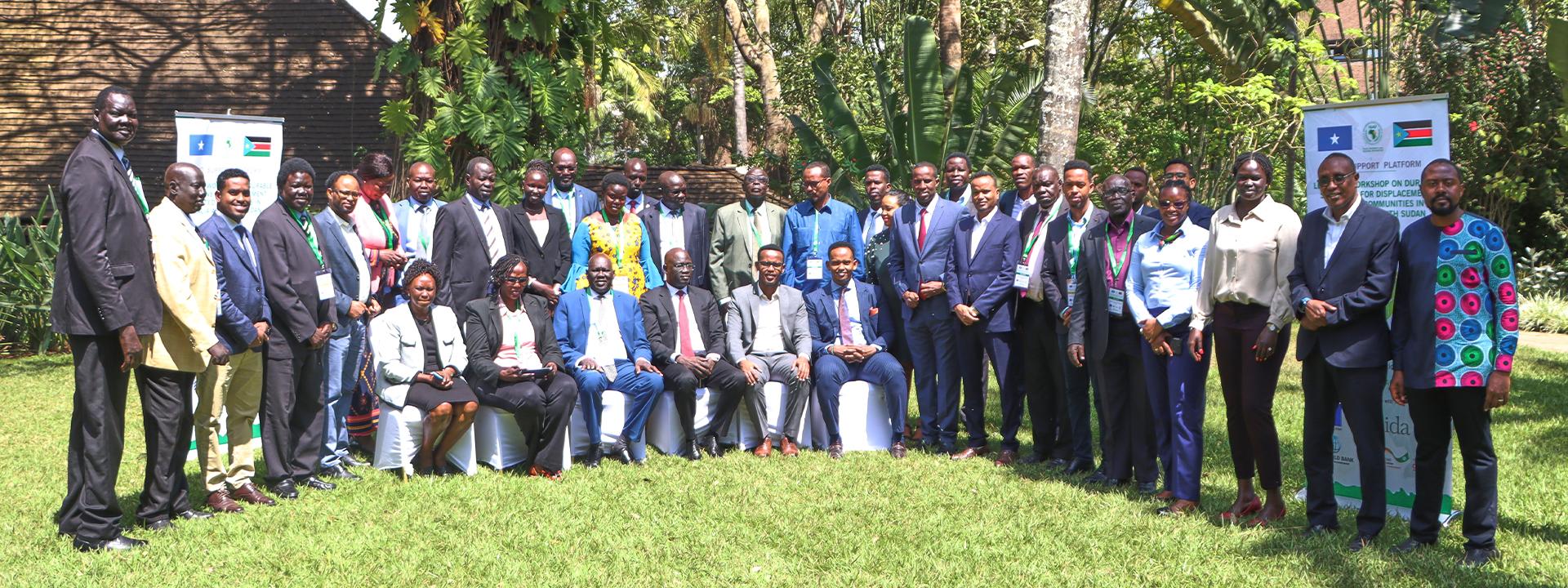July 12, 2023 (NAIROBI, Kenya): The IGAD Secretariat under the auspices of the IGAD Support Platform on Forced Displacement successfully convened a learning and exchange workshop on Durable Solutions between Somalia and South Sudan to better understand and apply the context-related lessons in their respective countries.
The workshop held on 11-12th July in Nairobi, Kenya brought together delegates from various institutions in Somalia and South Sudan that coordinate different aspects of refugees, asylums seekers and IDPs in the context of durable Solutions.
The National Commission for Refugees and IDPs (NCRI) and the National Durable Solutions Secretariat in the Ministry of Planning, Investment and Economic Development represented Somalia. The NCRI is the operational Unit in matters related to Returnees, Refugees and IDPs while the coordination function is the responsibility of the National Durable Solutions Secretariat (NDSS). The NDSS is composed of 14 government institutions, including the Office of the Prime Minister and the NCRI.
The Secretariat provides technical expertise and high-level strategic guidance and oversight to ensure that durable solutions initiatives are prioritized and implemented in Somalia across levels and are in line with the NDP-9, Resilience and Recovery Framework (RRF), and other relevant government frameworks and policies.
In South Sudan, durable solutions initiatives are coordinated by the National Task Force Committee (NTC), made up of 15 Ministries and Commissions and chaired by the Ministry of Humanitarian Affairs. The operations of refugee affairs are coordinated by the Commission for Refugee Affairs (CRA) while the Relief and Rehabilitation Commission (RRS) coordinates matters of IDPs and Returnees.
The Federal Government of Somalia established the durable solutions secretariat in 2016 and approved the Durable Solutions Strategy (2020 – 2024) in 2019 and has since made tremendous progress in its implementation while the Durable Solutions Strategy for South Sudan has been validated awaiting to be passed by the Cabinet.
The workshop’s main objective was to exchange experiences and lessons on the establishment and operationalization of the Durable Solutions entity in Somalia, discuss challenges, best practices in both the establishment and operationalization of a Durable Solutions Entity and highlight the coordination and synergies between different stakeholders in the Durable Solutions platform in the context of Somalia.
In his remarks, Charles Obira, the Coordinator of the IGAD Support Platform on Forced Displacement, who represented the Director of Health and Social Development, IGAD, Mme Fathia Alwan, said that experience sharing on Durable Solutions to forced displacement is paramount to IGAD.
“The IGAD support platform assists member states in developing policies, legal frameworks, and implementing initiatives related to durable solutions hence, this exchange and learning workshop aims to establish a foundation for two countries to learn from each other’s experiences as they launch Durable Solution units domestically.”
“This strengthens knowledge and experience sharing in the IGAD region and such forums help draw lessons that can be applied in member states’ contexts to aid in making informed decisions on matters related to Durable Solutions.”
He reiterated the need for both countries to further this collaboration. “We recommend that the Somalia and South Sudan delegations continue exchanging experiences bilaterally even after the conclusion of this two-day workshop.”
Technical Presentations were made in the areas of legal and policy frameworks, partnerships and coordination, Local authorities’ implementation of durable solutions in IDP hosting areas, challenges, opportunities and best practices on the durable solutions landscape in both Somalia and South Sudan.
Somalia also exhibited how the national durable solutions strategy has been implemented across government development plans including in education, Health, water, sanitation and hygiene, housing, land and property rights, livelihoods plus environment and climate change programmes. The mayors of the municipalities of Baidoa, Kismayo, Galka’ayo, and Beledweyne too showcased their application of Durable Solutions in their respective local authorities.
Hon John Dabi, the South Sudan Deputy Commissioner for Refugee Affairs, thanked the Somali delegation for sharing extensively based on the 4 years of implementation of the durable solutions strategy.
“We realize the significance of involving of the private sector and the benefits of diversifying funding sources, ensuring that implementation is Government led, anchoring the strategy in national development plans and the overall coordination structures up to local authorities.”
“Understanding how monitoring, evaluation, and reporting of Durable Solutions are conducted in Somalia is of utmost importance as the South Sudan strategy takes shape,” Hon John Dabi commented.
Mr. Zakariye Harbi, the Policy Advisor from the Ministry of Planning, Investments and Economic Development at the Federal Republic of Somalia and head of the Somalia delegation thanked IGAD for organizing the exchange and learning workshop.
“This event has not only allowed us to gain insights from South Sudan, but it has also provided an opportunity for self-reflection as a country in the ongoing implementation and review of the durable solutions strategy”.

